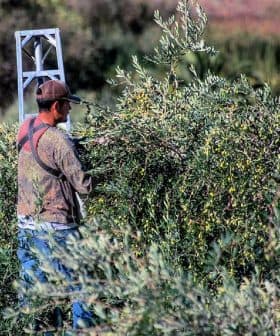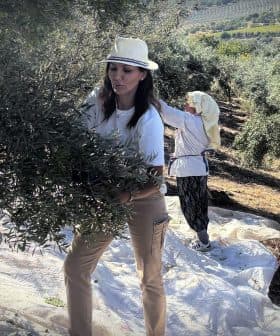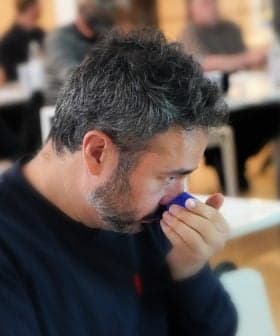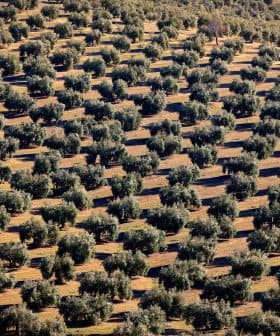Virginia Beach Event to Champion the Mediterranean Lifestyle
The Let’s Fight Back Foundation is hosting an event at the Museum of Contemporary Art in Virginia Beach to promote extra virgin olive oil as a tool in preventing chronic illnesses, with medical doctor Simon Poole and chef Amy Riolo attending. Foundation founder Chasity Pritchett aims to empower communities to combat chronic diseases through the Mediterranean lifestyle, highlighting the health benefits of olive oil and offering a free 12-week course on incorporating it into daily habits.
On May 22, 2025, the Let’s Fight Back Foundation will host an event at the Museum of Contemporary Art (MOCA) in Virginia Beach, highlighting extra virgin olive oil as a powerful ally in the fight against chronic illnesses.
Simon Poole, a Cambridge-based medical doctor, author and health consultant who has spent years investigating the mechanics of the Mediterranean diet, will attend the event.
The event will highlight the scientific evidence supporting the role of extra virgin olive oil in preventing chronic diseases.
See Also:Olive Oil Industry Pushes for Tariff Exemption at D.C. Event“Not only does the oleic acid promote good cholesterol levels, but it also has anti-inflammatory effects and can support healthy glucose regulation,” Poole told Olive Oil Times in a recent interview, referring to some prominent health benefits of daily olive oil consumption.
Other guests will include Amy Riolo, an award-winning chef and ambassador of Mediterranean cuisine.
As an author and expert speaker on healthy cooking, she has highlighted on several occasions how good-quality extra virgin olive oil is an essential addition to any dish, enhancing flavor while also boosting nutritional value.
I feel like the U.S. is kind of left out, and my demographic is left out. To me, it’s important that we can all share this knowledge.
The Let’s Fight Back Foundation, established by Emblem Olive Oil founder Chasity Pritchett, is dedicated to empowering communities to combat chronic diseases by promoting what Pritchett defines as “the Mediterranean lifestyle.”

Chasity Pritchett’s Let’s Fight Back Foundation promotes olive oil’s health benefits to underserved communities. (Photo: Chasity Pritchett)
“I don’t like to call it a ‘diet’ because diets are usually perceived as temporary behaviors. Instead, this is the way we’re going to eat forever. So, it’s more of a lifestyle,” Pritchett told Olive Oil Times.
“A fight for your life” is the title of the event.
“We are only here for a limited time, here on Earth, we’re all going to pass away. So why are we going to allow the things we eat to bring us to an early death?” she said. “People are now starting to fight for their own lives and the lives of the people they love.”
“They are fighting because every week they want more out of life, and they do not want to be stuck on medication just because of the way they were brought up to eat,” Pritchett added. “So it is a fight for your life, a life of abundance, a life of health.”
Pritchett’s journey began in 2019 when she discovered the health benefits of olive oil.
“After researching and hearing about the health benefits of olive oil, knowing that it can prevent and reverse heart disease, high cholesterol, ADHD and all these other chronic illnesses, I asked myself: why is this not known in my community?” Pritchett said.
In response, she launched Emblem Olive Oil, focusing not only on providing high-quality olive oil but also on educating consumers.
Recognizing the lack of representation of black individuals in the olive oil industry, Pritchett was motivated to create a brand that resonated with her community.
The foundation’s flagship program is a free 12-week course that teaches participants how to incorporate extra virgin olive oil into their daily cooking and eating habits.
“I am on a mission to empower individuals to regain their health and eliminate chronic illnesses. And that’s through the Mediterranean lifestyle,” Pritchett said.
According to its promoters, the program has led participants to experience significant health improvements, including weight loss and reduced blood pressure.
Pritchett explained that the May 22 event aims to bring together chefs, physicians and community members to bridge the gap between the culinary arts and medical science, demonstrating how extra virgin olive oil can be a central component in both.
According to Pritchett, who recently completed the Olive Oil Times Education Lab Sommelier Program in London, extra virgin olive oil should be recognized not only as a significant food ingredient but also as a medicinal superfood.
“I want to heal America. I want people to realize how important olive oil is and what it can do in your diet,” she said. “This initiative is a faith-based nonprofit, as without God, I do not believe I could do anything.”
The Let’s Fight Back Foundation’s efforts align with a growing body of research that supports the health benefits of extra virgin olive oil.
Studies have shown that consuming extra virgin olive oil daily can reduce the risk of cardiovascular disease, type 2 diabetes and certain types of cancer.
According to the foundation, the goal is to make extra virgin olive oil a staple in American households and a recognized tool in the fight against chronic diseases.
The challenges are significant. According to Pritchett, one of the major ones is the misinformation often found on social media about olive oil.
“That is very hard to counter. Anyone can say anything, like what they say about olive oil’s smoke point,” she said. “People repeat these things over and over and end up believing misconceptions.”
Another issue is olive oil pricing. “It’s about breaking habits, trying to explain to people what quality olive oil is and why it is important to choose that. Not easy to do when you can go into a store and buy a $4 (€3.5) bottle,” Pritchett added.
Olive oil consumption in the United States has dramatically increased in recent decades.
According to the International Olive Council (IOC), it rose from 79,000 metric tons in 1991/1992 to 398,000 tons estimated for the current 2024/2025 season.
However, IOC data show that the U.S. typically produces between 10,000 and 15,000 tons of extra virgin olive oil annually. Imports are expected to reach almost 400,000 tons in the current season.
These figures translate to a per capita consumption of less than two kilograms per annum in the U.S., far below the levels seen in olive oil-rich countries. In Spain, per capita olive oil consumption is estimated at almost ten kilograms per year.
According to Pritchett, the lack of diversity in the olive oil world has hindered awareness from spreading across the entire U.S. population.
“I feel like the U.S. is kind of left out, and my demographic is left out. To me, it’s important that we can all share this knowledge,” she said.
“On top of that, not much research on olive oil has included African-Americans or blacks,” Pritchett concluded. “I would like such a scenario to change. It’s a work in progress.”









